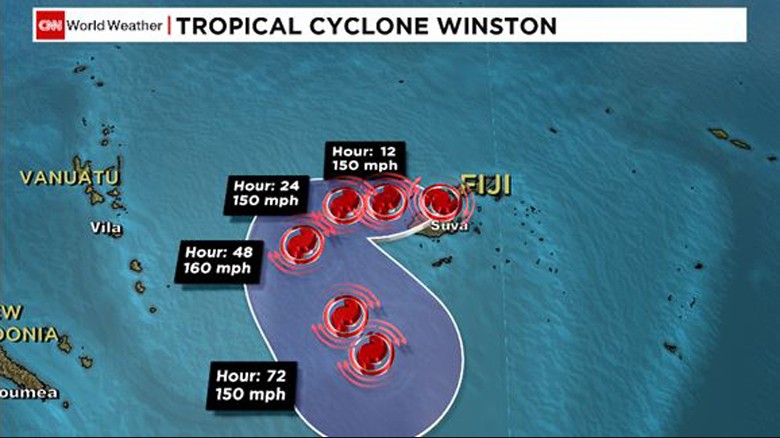
RECORD-SETTING TROPICAL CYCLONE WINSTON RE-ENERGIZES AS IT PUNISHES FIGI
Record-setting Tropical Cyclone Winston re-energizes as it punishes Fiji
(CNN)The most powerful storm on record in the Southern Hemisphere is reintensifying over open waters after making landfall in Fiji on Saturday evening.
CNN meteorologist Allison Chinchar said Tropical Cyclone Winston weakened slightly after making landfall in Fiji at around 7 p.m. Saturday (2 a.m. ET), but now that it's back churning over warm water, its eye is forming once again.
The Joint Typhoon Warning Center said winds were clocked at nearly 162 mph with gusts at nearly 200 mph, and is expected to batter the popular tourist destination with heavy flooding, rain and damaging winds
The Fiji Broadcasting Corporation reported that an elderly man was killed when a roof fell on him. There are no other reports of fatalities.
Fears of mudslides, coastal inundation
Fiji, an archipelago collectively about the size of New Jersey, lies in the South Pacific Ocean some 1,800 miles from Australia's east coast (by comparison, Hawaii is about 2,500 miles from Los Angeles). Most of the nation's 900,000 residents live on one of two main islands: Viti Levu or Vanua Levu.
Although not hit directly, the capital city of Suva was hit with "damaging gale force winds, heavy rain and power outages," according to the U.N. Office for the Coordination of Humanitarian Affairs (OCHA).
Nadi, a city of 52,000, was forecast to get destructive storm force winds over the coming days. Both cities are located on Viti Levu.
Widespread flash flooding and coastal inundation -- flooding in normally dry land -- "is likely as storm surges may push the sea inland several hundred meters," warned the Red Cross.
Mudslides are also a concern.
"This is a mountainous nation, and that means any heavy rainfall will filter down to the lower elevations -- meaning landslides, mudslides and flooding," said CNN meteorologist Derek Van Dam.
Fiji PM: 'we must stick together'
Had it occurred in the Atlantic, Winston would have been a category 5 hurricane, but because of hemispheric nomenclature, it's dubbed a cyclone. (In the Northwest Pacific, it would be a typhoon; all three are the same weather phenomenon).
No matter what you call it, Fiji Prime Minister Frank Bainimarama had his own name for it: an "assault."
"As a nation, we are facing an ordeal of the most grievous kind," Bainimarama said. "We must stick together as a people and look after each other."
Bainimarama, who said that the government is "thoroughly prepared to deal with this crisis," declared a state of emergency that will be in effect for the next 30 days, according to the Fiji Times.
CNN meteorologist Michael Guy said the storm will continue to track to the west before making a turn to the south over the next few days. It is expected to "keep strength as it continues on its path in open waters," he said.
The longer range forecast is that it will weaken Tuesday or Wednesday once it hits cooler waters and stronger shear, according to Guy.
El Nino effect
The tropical cyclone season in this region of the South Pacific runs from November 1 to April 30. Activity for the season is expected to be above average due to the ongoing record El Niño, which has brought above-average water temperatures to much of the Pacific.
Viti Levu, Fiji's main island, has had fewer than 10 direct hits from storms at or above hurricane intensity (sustained winds of 75 mph or greater), according to NOAA. Tropical Cyclone Evan, which struck the island in December 2012, had maximum winds of 145 mph, causing major damage but no fatalities.

